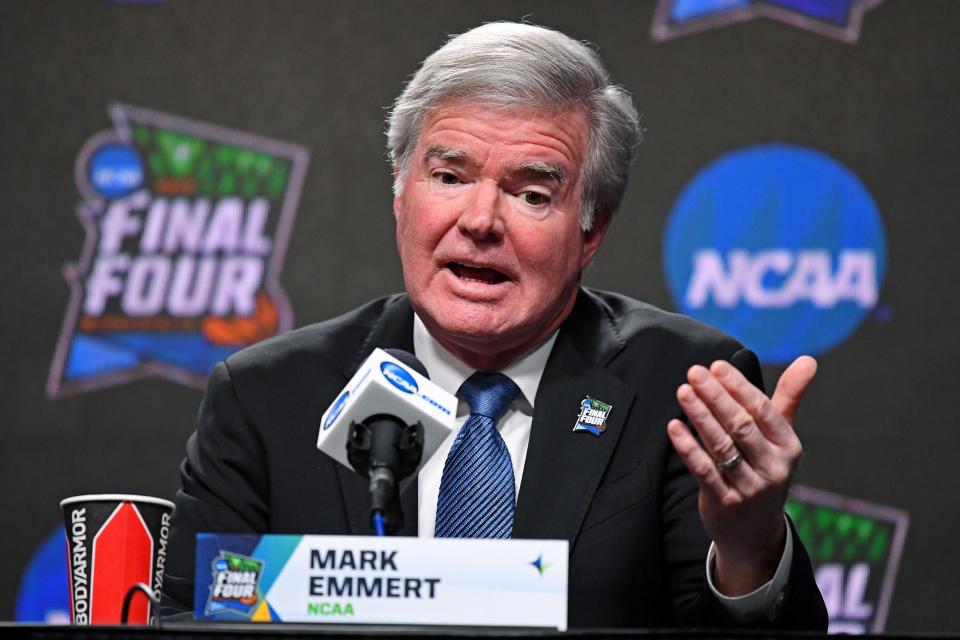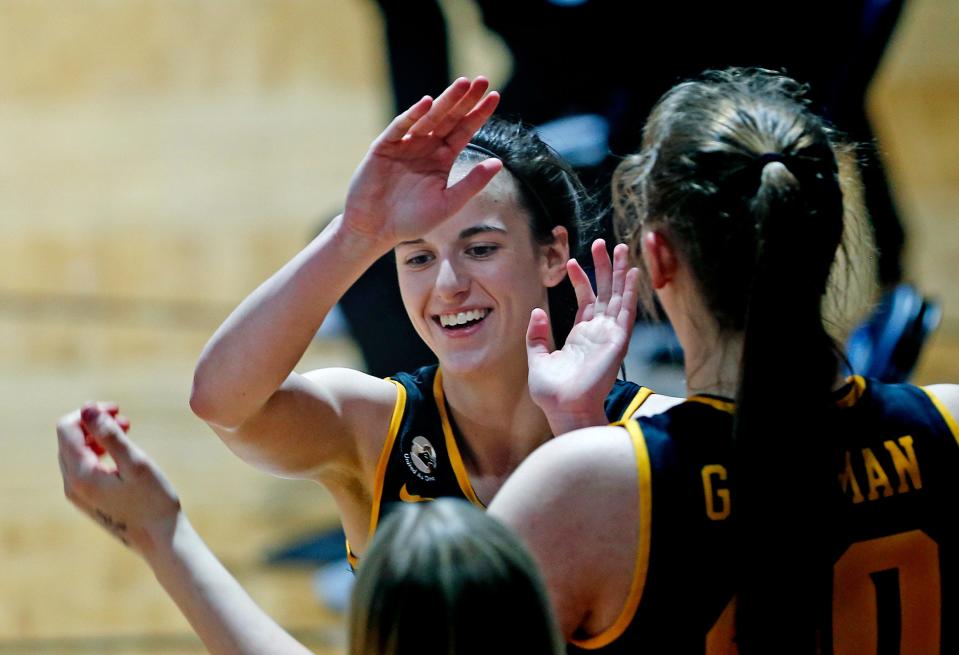Women's basketball players on track to meet with NCAA's Mark Emmert about name, image and likeness rights
A long-awaited meeting between three members of the #NotNCAAProperty movement and NCAA president Mark Emmert lasted about 40 minutes Thursday morning. In the aftermath, one primary question became a sticking point: Where were the women?
Correspondence between the parties obtained by the Des Moines Register and USA TODAY Sports shows that the men’s players leading the movement, including Iowa’s Jordan Bohannon, made it plain that they wanted women’s basketball players included — and that Emmert was willing to accommodate them.
Ramogi Huma, the executive director of a group that works to represent college athletes nationally, said in an interview Thursday afternoon “there was a little miscommunication” that resulted in the players not realizing what Emmert was offering them. He added that he, Bohannon and others are now trying to arrange a meeting that would involve women’s players.
Bohannon told the Register he expected a meeting involving women's players "should be happening ASAP."
And, given the tone of a Thursday media call that included two U.S. senators, four men’s players and four women’s players, there is plenty more to discuss. There has been increasing unrest in the disparities between the men’s and women’s NCAA Tournaments, most infamously the yoga mats and dumbbells that the NCAA initially was passing off as a weight room at the women’s event in San Antonio vs. the sprawling version at the men’s event in Indianapolis.

“Me personally, if I was on the call,” Michigan fifth-year senior Akienreh Johnson said, “I would have a lot of things to say.
“Women’s voices, you know, we tend to get really rowdy.”
A March 23 letter sent to Emmert by Bohannon, Rutgers' Geo Baker and Michigan's Isaiah Livers requested a meeting with the NCAA president and also stated, “To be clear, we are requesting a meeting with you that will also include other men’s and women’s basketball players as well as (Huma)."
A March 25 e-mail from Emmert expressed an openness to meeting with women’s student-athletes, too. "I also appreciate your interest in including other current men’s and women’s basketball student-athletes in our discussion. … Please feel free to share the names of the additional students you wish to include, and we will work with their schedules as well," Emmert wrote.
Huma said Baker, Bohannon and Livers received the letter but that's where the miscommunication occurred. Regardless, it was counted as progress that women will be included in future conversations surrounding college athletes' ability to profit off their name, image and likeness.
And progress toward NIL was of special interest to another women’s player on Thursday’s media call: sensational Iowa freshman Caitlin Clark.

While most of the leaders of the #NotNCAAProperty movement are college veterans, Clark is already a national star in the women’s game who plans to stay in Iowa City for at least the next three years.
“This is my future,” Clark said. “I want to take charge, take a stand and use my voice the best I can.”
Clark said she was “disappointed” not be included on the Emmert call but was also appreciative that she could be included on a Zoom call with U.S. senators Richard Blumenthal (D-Conn.) and Cory Booker (D-N.J.).
“When I committed here, I didn’t think anything like this (would happen),” Clark told the Register. “Obviously, the fan support in Iowa City is a reason I came here.
“That kind of goes back to my point on Megan Gustafson, how she could have really profited off this. I mean, Carver-Hawkeye Arena was pretty packed when she was playing here. Just to see the love of the city for her was special.”
Gustafson was an immensely popular former Hawkeye women’s star who led Iowa to the Elite Eight and was the 2019 Naismith national player of the year.
Clark and others on the call (men and women) say that NIL presents a huge opportunity for women’s players to capitalize on their prime earning years. Even top WNBA players are lucky to reach six-figure salaries.
"The best opportunity (for women) sometimes is in college," Michigan junior women's player Naz Hillmon said. "... I feel like the NCAA sometimes gives itself a pat on the back for giving student-athletes a head start. Well, on the women's side, you get your name out there, but in terms of endorsements and making connections that would lead to more endorsements once you get out of college, we're kind of at a standstill."
Baker, Bohannon and Livers were the only three players on the call with Emmert.
In that call, they made three requests:
That the NCAA’s member schools make a temporary rules change that would allow college athletes to make money from their names, images and likenesses during the 2021-22 school year. They said they envisioned this a one-year accommodation similar to the schools’ adoption of various blanket waivers that will give athletes an additional season of eligibility because the COVID-19 pandemic disrupted playing schedules in the spring of 2020 and the fall and winter of 2020-21.
That the NCAA pledge to “voluntarily abide by and enforce” Title IX, the federal gender-equity law. While schools are subject to the law because they receive federal funding, the NCAA — which is organized as a private, non-profit organization that does not get federal funds — is not subject to the law in areas it administers, like championship events.
“I feel like that request is visible, it’s clear, something we all can get done,” Livers said. “It’s something I have passion for, because I want everybody to have an equal opportunity and equal chance.”
Arrange a meeting between the players and two of the NCAA’s top governing groups – the Division I Council, which is comprised mainly of school and conference administrators, and the NCAA Board of Governors, which comprises college presidents from all three of the association’s competitive divisions.
At present, there are two bills pending in Congress pertaining to NIL rules and other potential benefits athletes could receive.
Blumenthal and Booker offered legislation in the last Congressional session that would have given athletes a comprehensive set of benefits, including revenue-sharing with the schools and comprehensive long-term health care. During Thursday’s news conference, Blumenthal said they will be reintroducing a similar bill for which they are trying to gain at least some Republican support.
Speaking about Emmert, Blumenthal said: “He says he wants Congress to help him. Well, we're going to help him. But the help we're going to give him is not help to the NCAA. It's help to the athlete, because his lack of leadership and, frankly, the NCAA lack of leadership and the colleges' lack of leadership has brought us to this point."
He called the NCAA’s response to women’s basketball issues, including its hiring of an outside law firm to investigate them, "clueless and sexist."
Emmert, in his Final Four news conference later Thursday, said he was "incredibly impressed" with Baker, Bohannon and Livers.
"They represented, I think, the views of many athletes very, very well. I want to personally continue that conversation with them," Emmert said. "But I also want them and their colleagues to do the same thing with women athletes. ... I haven't talked directly with any of the student-athletes on the women's side, but want to do that as soon as possible."
Berkowitz writes for USA TODAY Sports
This article originally appeared on Hawk Central: Women's basketball players plan to meet with NCAA about NIL rights

